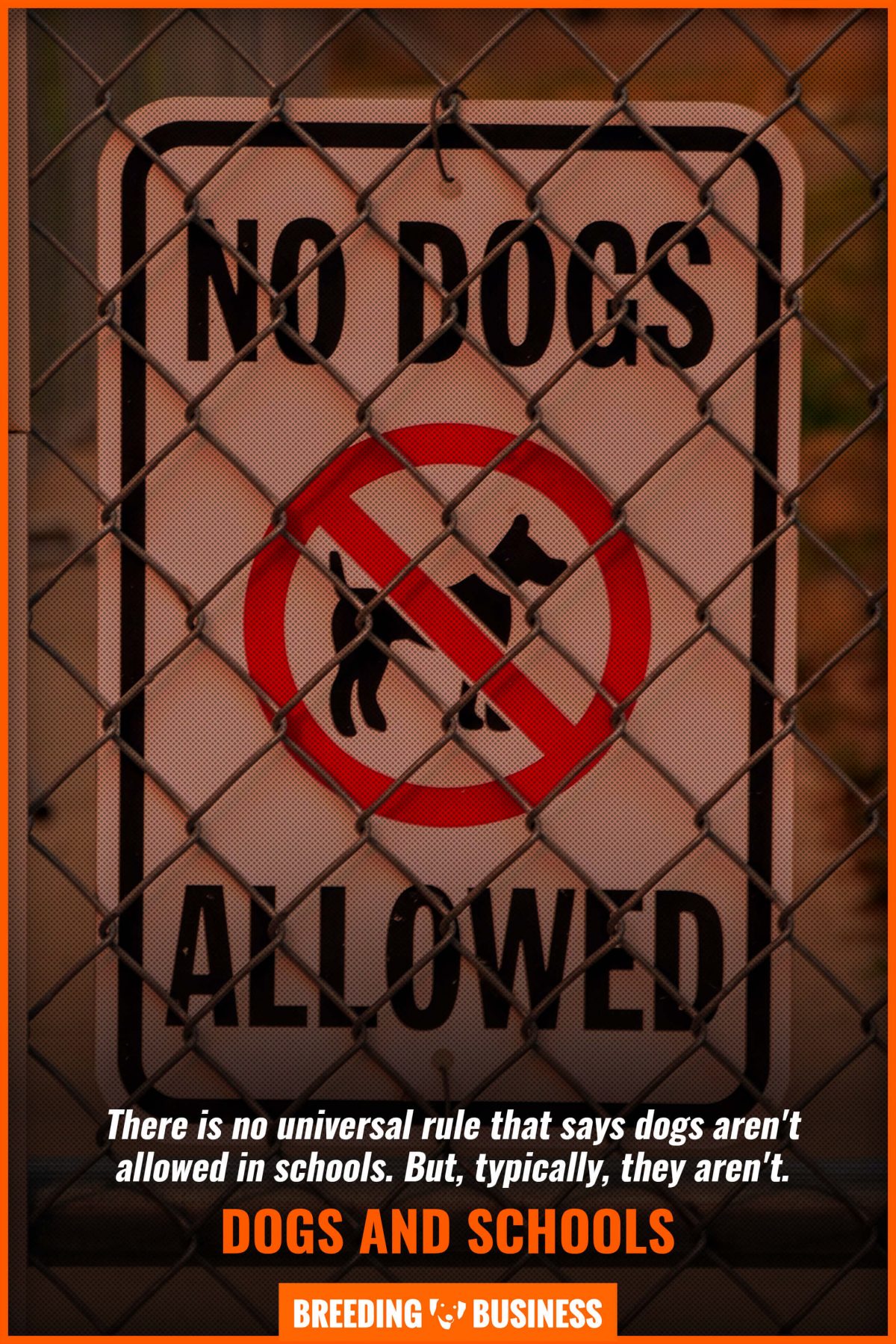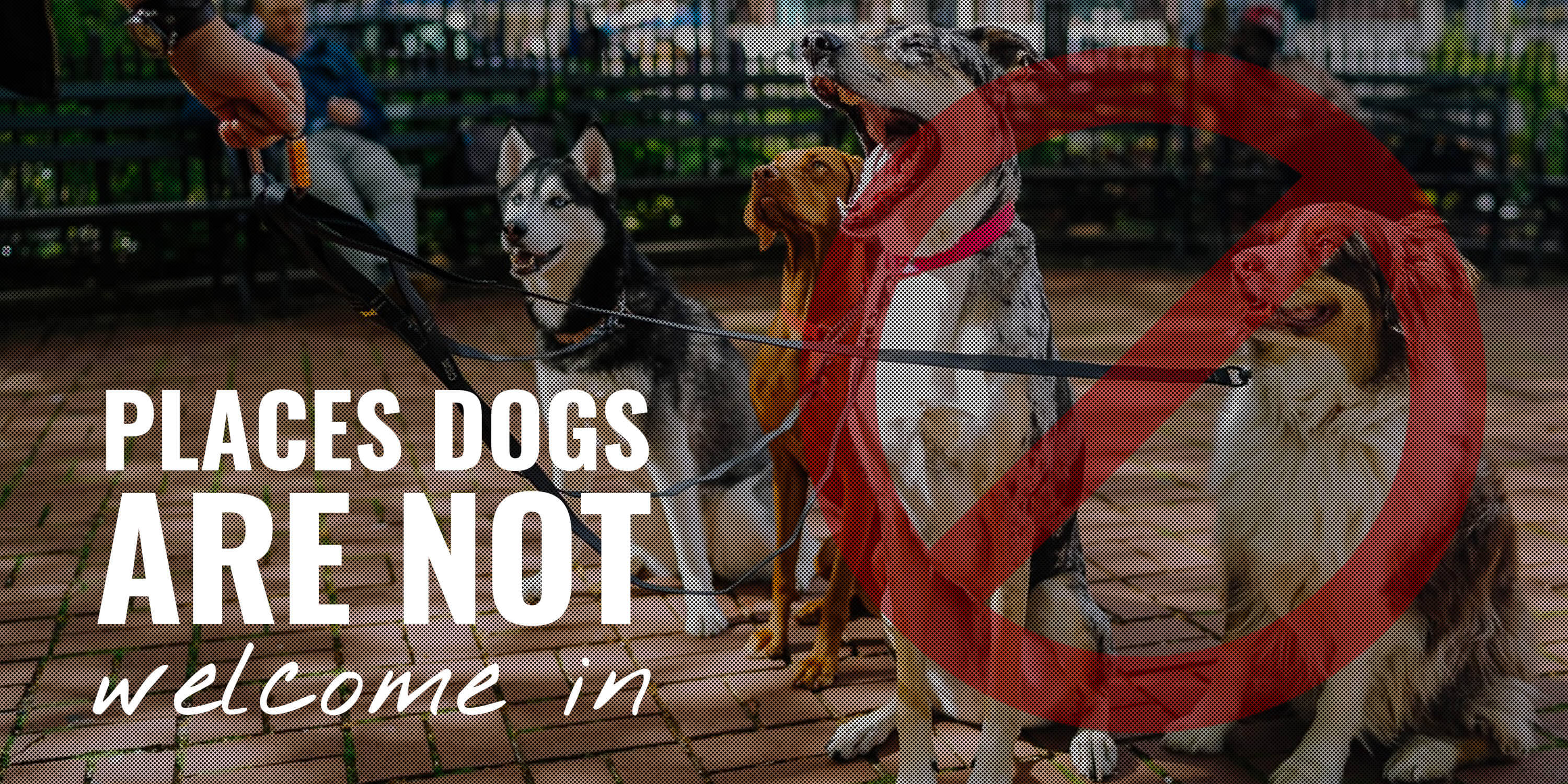Whilst we love our four-legged family members more than absolutely anything, there are some places that dogs are just not welcome in.
Whilst service dogs are allowed to accompany disabled people everywhere by law (ADA), there are some places that are just incompatible with pet dogs. The majority of the time, the reasons include health & safety, but there are others too. Let’s take a look at what they are and the 12 places that don’t allow dogs.
1. Hospitals
Dogs are not typically allowed into hospitals because patients with compromised immune systems could react badly to germs bought in by dogs from the outside world.
Patients with allergies to dogs could also have their recoveries slowed by the presence of an allergen.
That said, some hospitals make allowances for patients enduring long-term stays or terminal illness. In fact, pet & therapy dogs visiting patients is becoming more & more common.
This is due to the positive effect interaction with a dog has on the mind of humans. One study found that petting a dog for only 15 minutes boosts the levels of the love & happiness hormones in the brain, and reduces the stress hormone cortisol. It can even lower blood pressure by 10%.
In a 2017 RCN survey, 82% of nurses said that interaction with animals helped patients to be more physically active, and 60% believed it improved physical recovery.
When enquiring about a canine hospital visit, make sure your dog is up to date with his vaccines, clean, well-socialized, and well trained.
2. Casinos
According to BetAndBeat, casinos and other gambling rooms are not pet-friendly for a few reasons. The main one is that gamblers require concentration and dogs can be huge distractions. Customers won’t be too happy if they lose money after getting distracted by your dog! Imagine the disputes arising from a dog barking, and a player losing a huge bet.
Casinos are quite stimulating places; lots of lights, noises, and people. This kind of stimuli can cause dogs to become alert and behave in ways that garner attention. Add to that, potentially smelly dogs and very large breeds such as Great Danes, it’s an easy decision for casinos to disallow dogs on their floors.
Lucky you, though, you can still play on online casinos with a dog on your lap (which is not the case of the other places in this article)!
3. Police Stations
Whilst you can take a dog into a police station, it’s not recommended unless it’s necessary.
Dogs are very sensitive & intuitive animals. If there is anyone in the police station causing trouble, dogs can become protective of their owners and act aggressively. This may be well-intentioned, but it could have serious consequences for the dog and owner if someone gets hurt.
Police dogs may also be in the vicinity. Whilst police dogs are well socialized, some dogs are not. And the average dog does not want to be in a fight with a police dog!
4. Schools
There is no universal rule that says dogs aren’t allowed in schools. But, typically, they aren’t.
In order for children to learn, they must have as few distractions as possible. And what is more distracting than a cute, friendly dog? Alternatively, some children are scared of dogs.
That said, most schools do allow dogs on the property upon special requests, such as for show & tell and therapy dog sessions.
Campaigns for schools to have resident dogs are gaining popularity, due to the evidence that regular interaction with dogs can teach children empathy, trust, and respect.

5. Museums
Museums house artifacts of historical, cultural, and/or academic importance that must be preserved. Therefore, pets are not compatible with museums.
Curious dogs could accidentally cross a boundary and lick, chew or knock something over, causing damage. Even the most well-behaved dogs could cause damage – molting hair could easily contaminate displays!
That said, there are a few pet-friendly museums if you and your pooch are looking to soak up some culture.
6. Cinema
Dogs are not usually welcome in movie theatres for a few reasons. First of all, they often serve food. Though many bars, cafes, and restaurants are dog-friendly, they take extra precautions to keep it clean from hair, and cinemas don’t really have a reason to do this.
Most dogs don’t like to sit still or lay down for long periods of time in unfamiliar places around strangers. They would be bored sitting through a movie in a movie theatre. This could cause behavior that would distract and annoy fellow movie go-ers.
Some dogs may also find the bright screen uncomfortable to look at or even be frightened by the darkness and loud sounds coming out of the speakers.
7. Theaters
Dogs are also not usually welcome in regular theatres either. Many of them do allow dogs during day time visits and tours, but not during performances.
This is because if a dog needs something during a performance, or is not well-behaved or comfortable in public spaces, their behavior may distract not only the audience but the actors and affect the entire production.
8. Religious Temples
Dogs are welcome in some religious buildings, but not all.
Protestant churches more often than not welcome all of God’s creatures, and some have even been known to baptize pets. Animal-friendly ministries are found in every state across America.
Catholicism traditionally takes the view that non-human animals do not have souls, and therefore their churches do not welcome the soulless. However, more recently, Pope Francis has suggested that he opposes this view, saying: “Holy Scripture teaches us that the fulfillment of this wonderful design also affects everything around us.”
Similar to Catholicism, many orthodox Jewish synagogues don’t allow dogs, though more and more are starting to.
Mosques are traditionally not dog-friendly, as Islamic culture views dogs are unclean and unholy. This attitude has improved slightly in some places. In the UK in 2008, an 18-year-old Muslim boy was the first to be granted permission by the Muslim Council of Britain that his guide dog could attend the mosque with him, although not inside any of the prayer rooms.
More often than not, Sikh, Buddhist, and Hindu temples welcome dogs as their religions are generally much more inclusive of animals. But never assume, and always check with the individual establishment whether or not dogs are allowed into the building.
9. Luxury Hotels
Although there are countless dog-friendly hotels these days, the majority of luxury hotels don’t accept dogs as guests!
The main reason for this is that luxury establishments need to completely ensure flawless levels of cleanliness. As we all know, dog hair is stubborn. Sometimes it doesn’t matter how long you spend cleaning a room, some hair will always remain!
That said, some luxury hotels do welcome dogs in their public spaces, just not inside the bedrooms.
10. Fine-Dining Restaurants
Again, plenty of eating establishments allow dogs. But high-class fine dining restaurants need to be able to ensure the highest sanitation standards for the prices they charge. Therefore, no dog hair allowed… Most of the time!
Dog-friendly Michelin star restaurants are on the rise – and some of them even offer menu options just for the dogs!
11. Zoos
Zoos are filled with wild animals. Not only could your dog frighten one of them and cause distress or aggression, one of the animals could pique your dog’s curiosity, too.
Even the most well-behaved dog could try to get up close to one of the animals, either out of curiosity, friendliness, or aggression if they’re faced with an animal they’ve never seen before.
This could result in a dangerous situation for your dog if they get away from you and approach a potentially dangerous animal.
They could also catch or pass on an illness, such as parasites.
12. Beaches
The majority of beaches are dog friendly these days, but some of the particularly touristy ones make more money from human visitors. They may not allow dogs to make a quieter, safer, and cleaner environment for families with children.
However, a lot of these beaches usually allow dogs during the off-peak seasons. They usually have signs displayed to let you know, but always check the website of the beach or local government to avoid getting fined!
Those are 12 places dogs are not welcome in. We wish our dogs could go everywhere with us!

4 comments on “12 Places Dogs Are Not Welcomed In”
Are buses dog friendly too? Can someone bring their dog to a bus?
DOGS do NOT need to be in restaurants or the grocery store – Period!!!! Keep them outside where they belong, at home or in their kennel. If you have a so-called service dog – stay home with it.
How stupid! My service dog required 2 years & over $50,000 in training to allow this disabled Veteran to safely eat in a restaurant, use a decent hotel or public transport. Why idiots refuse to honor my rights under the Americans With Disabilities act is beyond understanding. You automatically assume every Service Animal is a fake, probably because you fake everything in your life and think everyone else does too.
I agree
Dogs is smelly dirty and loud
Also a danger to kids
Keep your dog at home. It’s not a child that you need to take everywhere ffs